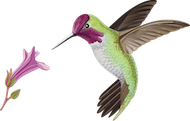PRESS INQUIRIES
Diane Shader Smith
310.386.6803
dianeshadersmith@gmail.com
Nature Close to Home
Xerces executive director Scott Hoffman Black encourages you to “reimagine your garden: increase the diversity of native plants, ensure that there are places for insects to nest, and avoid using pesticides.”
Rare California trout species returns to native habitat
For the first time in nearly a century, a rare California trout species is swimming in a mountain creek that is its native habitat, marking a major milestone that conservationists hope will lead to a thriving population and removal of its threatened status.
A Marine Heat Wave Intensifies, with Risks for Wildlife, Hurricanes and California Wildfires
The last Pacific ‘warm blob’ killed seals and birds, shut down crab fisheries and also affected the land, worsening drought and wildfire risk in California.
Seabird “Preyscapes” in the Age of Climate Change
How breeding seabirds respond to climate-driven changes in their food sources
Just how dangerous are balloons for the environment and wildlife?
According to the Wildlife Center of Virginia in Waynesboro, balloon remnants fall into bodies of water such as streams, lakes and oceans, and can take months to years to fully break down.
Chico remains safe haven for giant garter snake
Giant garter still considered ‘threatened’
Huntington Beach committee proposes campaign to get people to stop feeding wildlife in parks
The idea received unanimous approval from the Central Park Committee on Wednesday, with some suggestions.
PHOTOS: Comedy Wildlife Finalists Offer Ode To Silly Serendipity
Soils Could Be Affected by Climate Change, Impacting Water and Food
Coasts, oceans, ecosystems, weather and human health all face impacts from climate change, and now valuable soils may also be affected.
Huge decline in songbirds linked to common insecticide
Neonics—pesticides introduced to plants at the seed stage—act like an appetite suppressant for birds, making them lose weight within hours.

